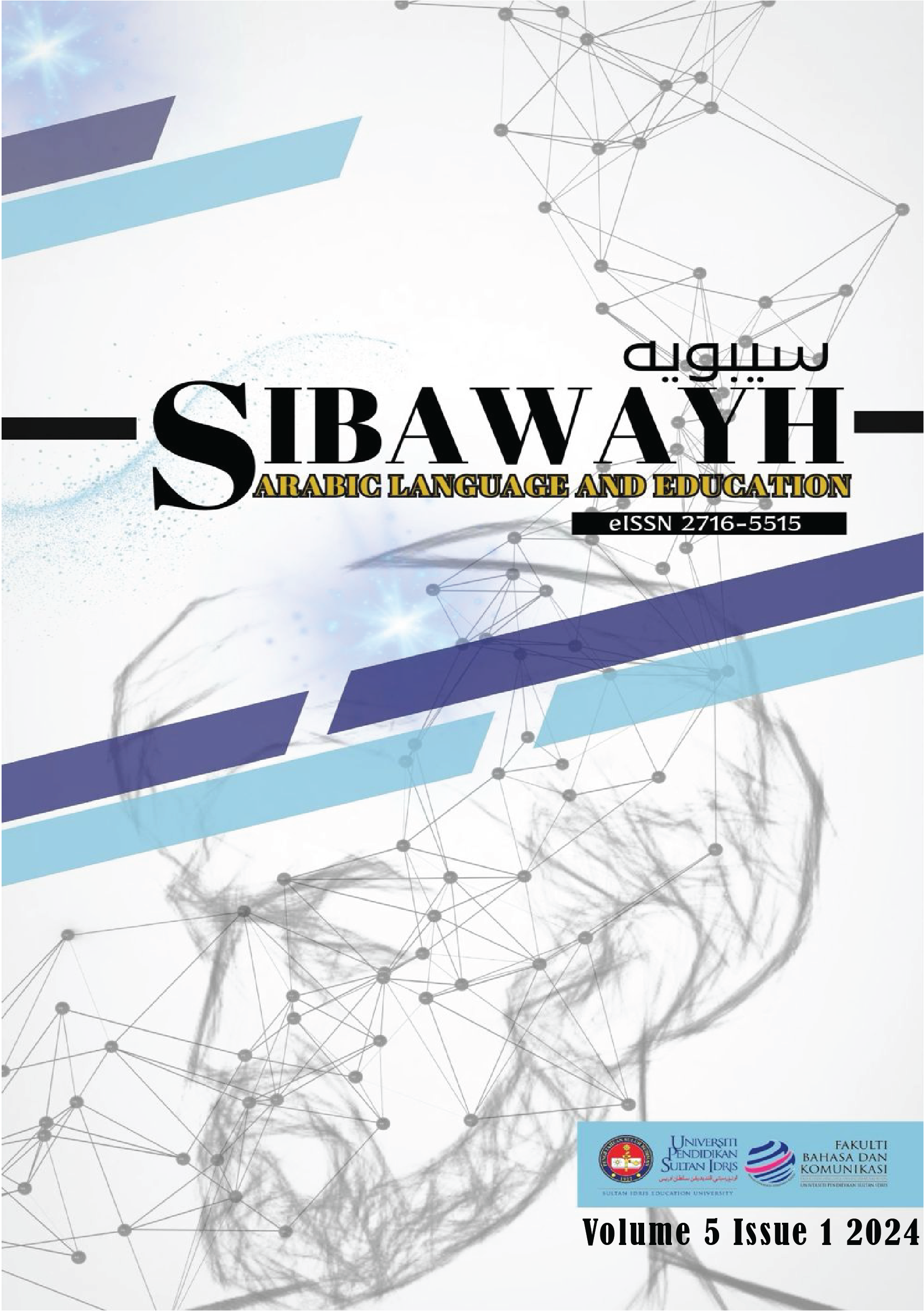فعالية استخدام ابتكار "ب.و.ف.ي.م" لتعزيز فهم تصريف الفعل المضارع لدى طلبة السنة الثانية في منطقة كوالا لانجات بولاية سلانجور
The Effectiveness of Using the B.O.F.I.M Strategy to Enhance Understanding of Present Tense Conjugation Among Second-Year Students in Primary Schools in the Kuala Langat Region, Selangor State
DOI:
https://doi.org/10.37134/sibawayh.vol5.1.9.2024Keywords:
تصريف الفعل المضارع, اللعبة, ابتكار B.O.F.I.M.Abstract
تهدف هذه الدراسة إلى معالجة مشكلة الارتباك التي يواجهها الطلاب عند تعلم تصريف الفعل المضارع في اللغة العربية، حيث يعتبر تصريف الفعل المضارع من أكثر الجوانب اللغوية تعقيداً بالنسبة للطلاب، خاصةً فيما يتعلق بفهم وإضافة حروف المضارعة التي تشير إلى الجنس والعدد وتطابق الفعل مع الضمير المناسب. يترتب على هذه الصعوبات ضعف في أداء الطلاب وقدرتهم على حفظ التصريف بشكل دقيق. ومن هنا، تسعى الدراسة إلى تقييم فعالية استخدام ابتكار B.O.F.I.M كأداة تعليمية مبتكرة لتسهيل فهم الطلاب لتصريف الفعل المضارع، لا سيما فيما يتعلق بتحديد حروف المضارعة المناسبة بناءً على الضمائر المختلفة. شملت الدراسة 37 طالبًا من معهد في كانجوغ دارت بولاية سلانجور، تم تقسيمهم إلى 22 طالبًا و15 طالبة. تم تقييم فعالية ابتكار B.O.F.I.Mباستخدام الاختبارات القبلية والبعدية التي أجريت عبر الإنترنت، بالإضافة إلى الملاحظات الميدانية أثناء عملية التدريس. أظهرت النتائج أن الابتكار ساهم في تحسين قدرة الطلاب على فهم تصريف الفعل المضارع وحفظه بشكل أكثر سهولة وفعالية، وذلك من خلال تطبيق أساليب بصرية وغنائية تفاعلية تركز على تبسيط المفاهيم اللغوية. تساهم هذه الدراسة في تقديم أسلوب تعليمي مبتكر يعزز من أداء الطلاب في مادة اللغة العربية، ويعالج بشكل مباشر الصعوبات التي يواجهونها في تعلم تصريف الفعل المضارع، كما تفتح الباب أمام استخدام استراتيجيات تعليمية جديدة تعتمد على التفاعل والتحفيز.
This study embarks on a journey to address the confusion faced by students when learning the conjugation of the present tense verb in Arabic, a linguistic aspect deemed highly complex for learners. This complexity arises particularly in understanding and applying the markers of mood that indicate gender and number, and aligning the verb correctly with the appropriate pronoun. These challenges result in poor student performance and their inability to memorize verb forms accurately. To navigate through these academic rapids, the study evaluates the effectiveness of the innovative educational tool B.O.F.I.M, designed to ease students' understanding of present tense conjugation, focusing especially on identifying the correct mood markers based on different pronouns. The study encompassed 37 students from one of the secondary school in Selangor, divided into 22 boys and 15 girls. The efficacy of B.O.F.I.M was assessed through pre and post-tests conducted online, along with field observations during the teaching process. The results illuminated that the innovation significantly improved students' abilities to understand and memorize the conjugation of the present tense verb more effortlessly and effectively. This was achieved by employing interactive visual and auditory methods that simplify linguistic concepts. This study contributes to presenting an innovative teaching style that not only enhances students' performance in the Arabic language but also directly addresses the difficulties they encounter in learning verb conjugation. Moreover, it opens doors to new educational strategies that rely on interaction and motivation, paving the way for a more engaging and effective learning environment.
Keywords: Tasrif Fi’il Mudhori' (conjugation of present tense verb), game, B.O.F.I.M innovation.
Downloads
References
Abdull Majid, M. A. M., & Abdul Ghani, M. T. (2024). Penerokaan Elemen Bahan Bantu Mengajar yang menyokong Peningkatan Kemahiran Komunikasi Bahasa Arab dalam kalangan pelajar Sekolah Menengah di Daerah Setiu, Terengganu. Jurnal Pendidikan Bitara UPSI,17(1), 105–115. https://doi.org/10.37134/bitara.vol17.1.10.2024
Aluwi, A. M. & Abdul Ghani, M. T. (2023). Penguasaan Kosa Kata Terhadap Penulisan Bahasa Arab dalam Kalangan Pelajar Sekolah Menengah Agama Khairiah: Kajian daripada Perspektif Guru [Vocabulary Mastery of Arabic Language Writing Among Khairiah Religion Secondary School Students: AStudy from The Teacher's Perspective], Sains Insani, 8(2), 294-303.
Hani’atul Mabruroh, Muhyiddin, L., & Ningsinh, M. L. W. (2023). A Phrase about the negation tool “لا” in the Book Washoyā al-ābā’ lil Abnā’ (Case Study in Arabic Language): أداة النفي "لا" في الكتاب وصايا الاباء للأبناء (دراسة مدونة اللغة العربية). SIBAWAYH Arabic Language and Education, 4(1), 173–184. https://doi.org/10.37134/sibawayh.vol4.1.9.2023
Hussain, Y., & Abdul Ghani, M. T. (2024). Penerokaan Amalan Pengajaran Terbaik dalam Meningkatkan Kemahiran Menulis Bahasa Arab: Satu Kajian Perspektif Guru Bahasa Arab di Daerah Temerloh Pahang: Exploring the Best Teaching Practices in Enhancing Arabic Writing Skills: A Study on the Perspective of Arabic Language Teachers at Temerloh District, Pahang. Sains Insani, 9(1), 85-92.
Jamil, A., & Rahman, N. (2018). Penerapan kaedah pengajaran aktif dalam meningkatkan penguasaan tasrif fi'il mudhori' di sekolah menengah. Jurnal Pendidikan dan Pembelajaran, 16(1), 40-55.
Jie Ying, K., Yan Mei, S., & Ramli, S. (2020). The relationship between students’ need and Arabic course for business purpose at Yinchuan University of China. SIBAWAYH Arabic Language and Education, 1(1), 157–165. Retrieved from https://ejournal.upsi.edu.my/index.php/SIBAWAYH/article/view/3780
Mohamed Shalikin, N. H. (2024). Kepelbagaian pendekatan pengajaran dalam kalangan guru mata pelajaran Al-Lughah Al-‘Arabiyyah Al-Mu’asirah: The Diversity of Teaching Approaches Among Teachers of Al-Lughah Al-Arabiyyah Al-Mu’asirah Subject at Jeram Secondary Religious School, Selangor. SIBAWAYH Arabic Language and Education, 5(1), 25–35. https://doi.org/10.37134/sibawayh.vol5.1.3.2024
Muhammad Helmi Yakob, & Mohammad Taufiq Abdul Ghani. (2024). [MS] Cabaran Penggunaan Lughatul Fasli dalam Kalangan Guru Pelatih Bahasa Arab di Universiti Pendidikan Sultan Idris: The Challenges of Using Lughatul Fasli among Arabic Language Trainee Teachers at Sultan Idris Education University. Afaq Lughawiyyah, 2(2), 339–351.
Rohani, S., Suhaila, & Hakim. (2019). Pendekatan gamifikasi dalam pembelajaran Bahasa Arab. Jurnal Pengurusan dan Penyelidikan Fatwa, 3(1), 236.
Shafiq, A., Haron, M., Izzuddin, M., et al. (2017). Kemahiran dan penyediaan bahan guru Bahasa Arab terhadap penggunaan bahan bantu mengajar. Jurnal Sultan Alauddin Sulaiman Shah, 4(2), 125.
Shamshinar, N., & Azhan, N. (2023). Analisis kreativiti guru pelatih terhadap perancangan aktiviti pengajaran dan pembelajaran Bahasa Arab mendepani Era 4.0. Jurnal Pengajian Umum Asia Tenggara, 24(9), 29-35.
Yakob, M. H. (2023). Use of Lughatul Fasli among Arabic Language Training Teachers at Sultan Idris Education University. SIBAWAYH Arabic Language and Education, 4(2), 99–106. https://doi.org/10.37134/sibawayh.vol4.2.10.2023
Downloads
Published
How to Cite
Issue
Section
License
Copyright (c) 2024 Fatin Nur Syafiqah Mohamad Sharif

This work is licensed under a Creative Commons Attribution-NonCommercial-ShareAlike 4.0 International License.





